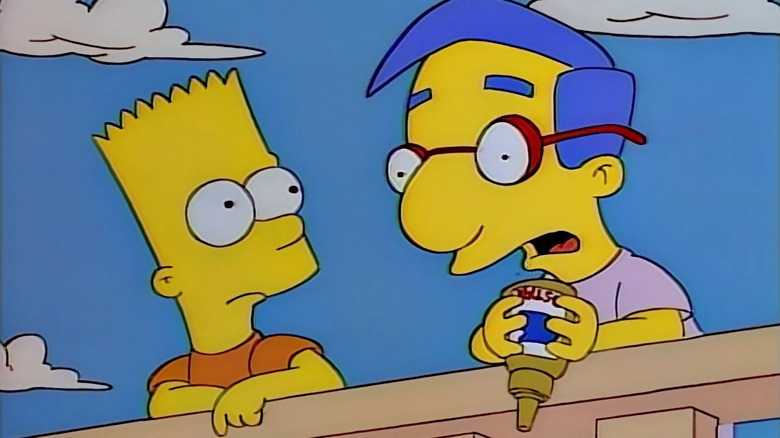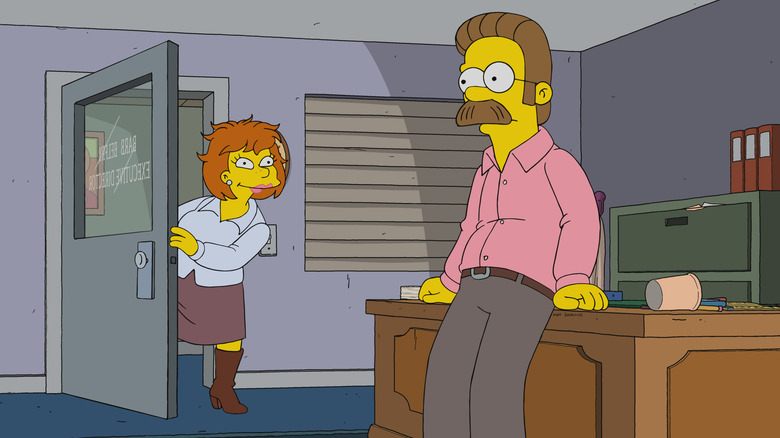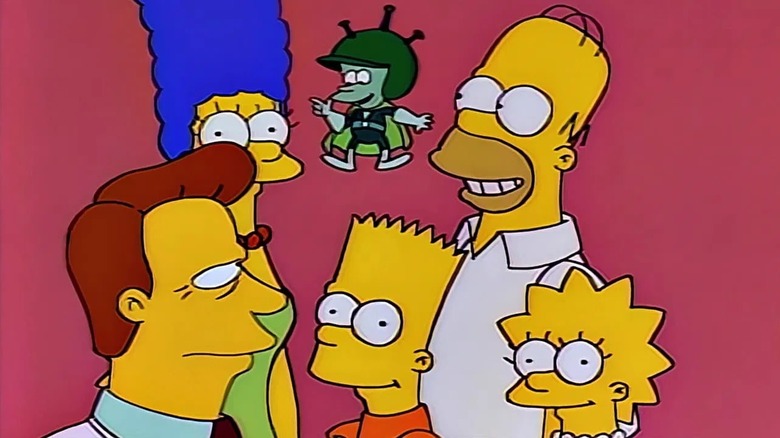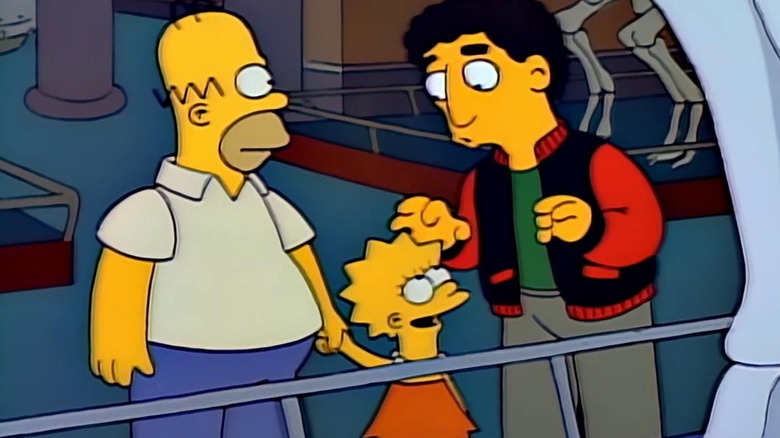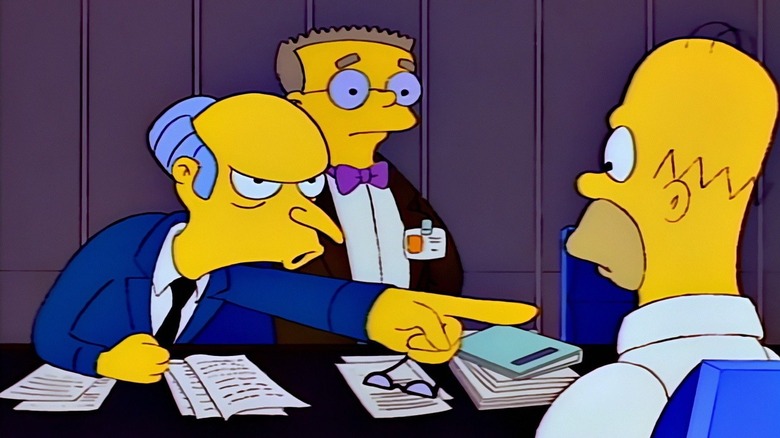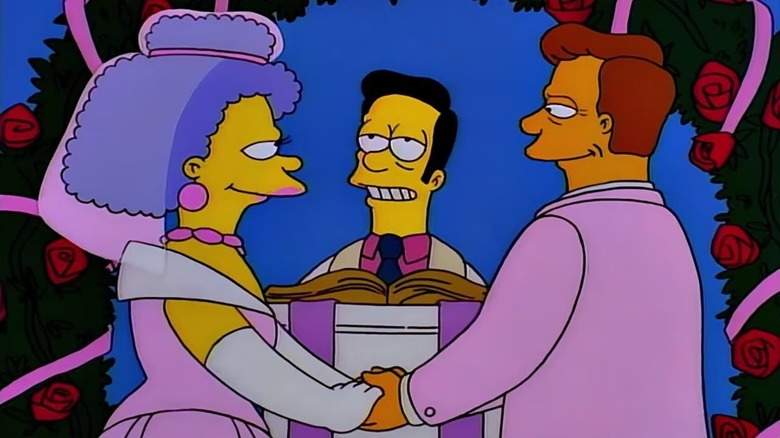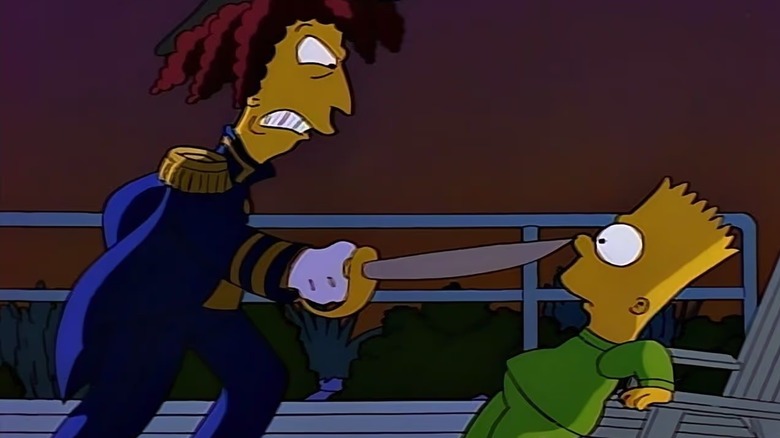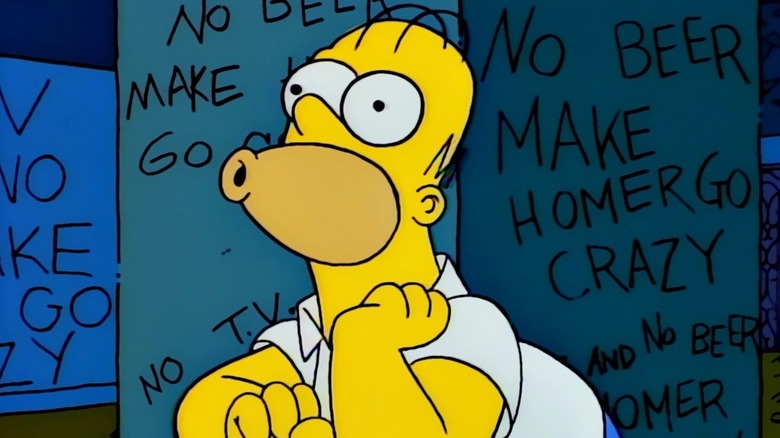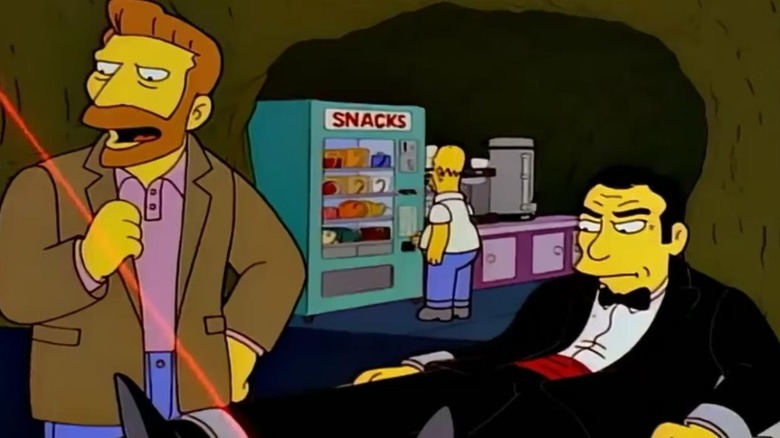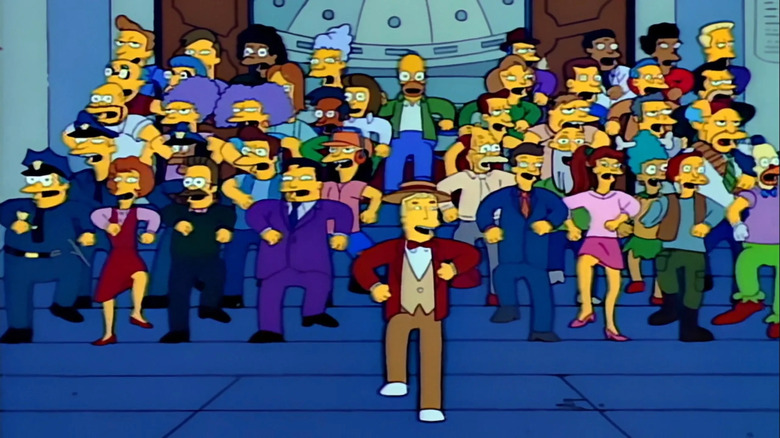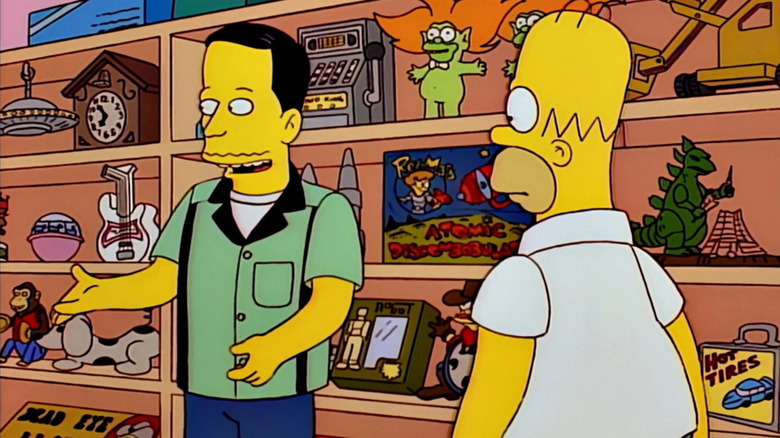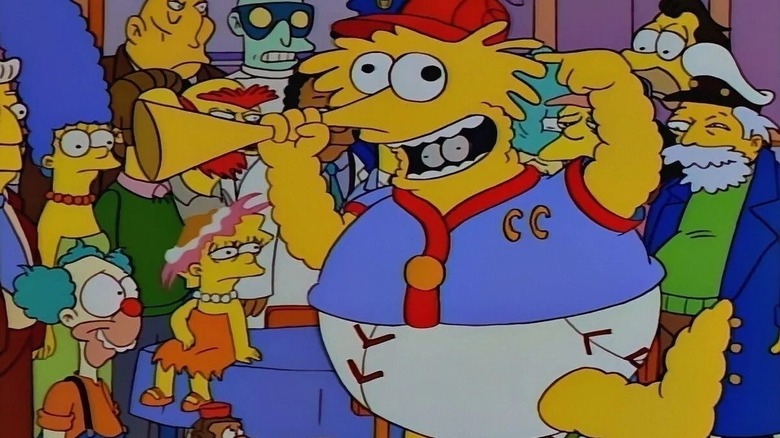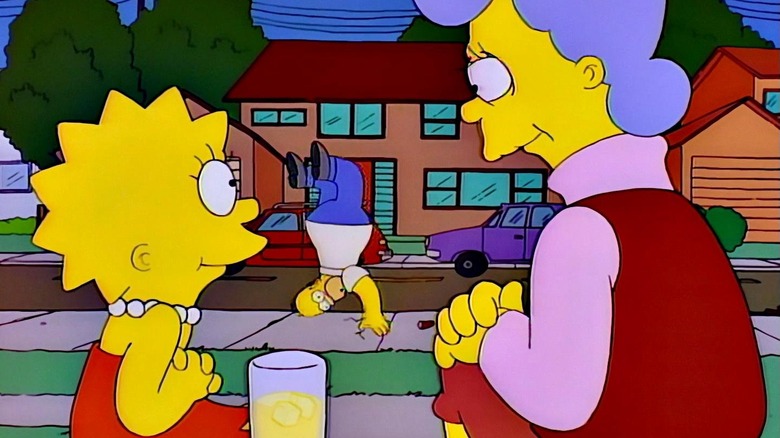The 12 Best Simpsons Episodes, Ranked
It's hard to imagine a better American TV show than "The Simpsons." This sitcom chronicling Homer, Marge, Lisa, Bart, and Maggie Simpson in the chaotic town of Springfield fully utilized the possibilities of the animation medium to create stories, gags, and emotional beats that couldn't exist on any other small-screen production. Today, countless adult-skewing animated programs fill the airwaves, yet the ingenious flourishes of "The Simpsons" still register as special. And its greatest traits are especially apparent in its best episodes.
Whittling down a dozen peak "Simpsons" installments (chosen per this writer's opinions) from the show's 790 episodes can be excruciating. Countless masterpieces, including "I Love Lisa" and "And Maggie Makes Three," somehow failed to make the list despite putting the very best of countless other shows to shame. However, exploring these episodes makes it easier than ever to digest why "The Simpsons" is special. The mold of the family sitcom is a great vessel for subverting television norms, getting audiences emotionally engrossed in the lives of animated characters, and creating jokes that the world would be absolutely worse off without.
Grab a donut, release the hounds, and proclaim that "everything is coming up Milhouse." It's time to explore the 12 best "Simpsons" episodes ever.
12. A Serious Flanders (Season 33, Episodes 6 and 7)
It's true that the first 10 seasons of "The Simpsons" have some of the strongest episodes in the show's run. However, just because later stretches of the show (e.g., Seasons 18-26) were the program's creative nadir doesn't mean all post-1999 "Simpsons" material is worthless. On the contrary, modern episodes from showrunner Matt Selman have an incredible track record and put some skip back in the show's step. Case in point: The two-part installment "A Serious Flanders," a parody of modern prestige small-screen dramas like "Fargo."
Many of the best Selman-era episodes thrive on breaking the format for a traditional "Simpsons" episode. This non-canon two-parter is no exception with its constant non-linear digressions, more elaborate camerawork, unexpected needle drops, and even a willingness to kill off long-standing characters like Mr. Burns and the Rich Texan. Better yet, this saga (focusing on Ned Flanders finding himself in progressively deeper trouble over a bag of money containing $173,296) is funny even beyond its skewering of Emmy-darling television. The jokes and animation are still entertaining even if one isn't familiar with "Fargo."
That's the kind of multi-layered comedy the greatest "Simpsons" parodies are built on. Executing such material effectively over 44 minutes of storytelling demonstrates real craftsmanship from writer Cesar Mazariegos and directors Debbie Bruce Mahan and Matthew Faughnan. Want proof "The Simpsons" can still crank out great episodes? Just marvel at the wonders of "A Serious Flanders."
11. The Simpsons Spin-Off Showcase (Season 8, Episode 24)
"The Simpsons Spin-Off Showcase" is an absolutely bizarre concept. This episode consists of three short segments, each imagining terrible "Simpsons" spin-offs inhabiting different genres, like a kooky variety show or a police procedural. The end result, though, is a hilarious production unlike anything else the program ever produced. One of many amusing traits here is how the ambiance of the episode is constantly floating around. The middle segment scores laughs out of skewering high-concept '70s sitcoms, for instance, which is wildly different from jokes emerging in the final segment, like Lisa Simpson getting "replaced" by a way-overaged actress for the family's variety show.
Each "Spin-Off Showcase" section is different from the other, while the entire episode is full of belly laughs you couldn't find elsewhere in the show. What normal "Simpsons" installment could have a gag about a love-tester machine wearing an ill-suited tuxedo? Ditto a joke about a "warning" crocodile sent by a New Orleans gangster. It's also a hoot that this particular endeavor offers up room for tons of memorable "Simpsons" supporting player appearances. That includes Phil Hartman's iconic Troy McClure hosting the wraparound segment, which allows this comedian to absolutely nail hysterical bits of slimy faux-warmth.
Obviously, none of these three fake shows displayed in "The Simpsons Spin-Off Showcase" would work as traditional stand-alone programming. As pieces of a larger whole in this episode, though, they're sources of inspired comedic lunacy.
10. Lisa's Substitute (Season 2, Episode 19)
Bart's rebellious antics got "The Simpsons" on people's radar. It was the effective pathos of episodes like Season 2's "Lisa's Substitute," though, that kept people glued to the screen. Written by Jon Vitti and directed by Rich Moore, this episode has Lisa fascinated by her incredibly encouraging and kind substitute teacher, Mr. Bergstrom (Dustin Hoffman). Lisa episodes tend to bring out the soulfulness of this show, as she navigates a boorish world and household that she doesn't belong in. That's especially true here, particularly with an unforgettable segment focused on Bergstrom bidding Lisa farewell by handing her a little piece of paper reading, "You are Lisa Simpson."
This sequence, devoid of intrusive jokes or self-conscious puncturing of the moving atmosphere, saw "The Simpsons" reaching a new level of creative confidence. Even after 30+ additional seasons, it's still one of the show's great scenes thanks to its heartfelt depiction of how unexpected people can leave the greatest impressions on our lives. Closing things out with a tender bonding sequence between Lisa and Homer provides the perfect capper for this episode. "Lisa's Substitute" also houses one of the production's earliest great guest stars, as Hoffman provides immense likability and warmth to this authority figure. Though only the 32nd "Simpsons" episode ever made, "Lisa's Substitute" was an emotional tour de force.
9. Last Exit to Springfield (Season 4, Episode 17)
"Last Exit to Springfield" is crammed so full of gags that it's hard to pinpoint just what the best joke in the entire episode is. On some days, it may seem like a certainty that an ominous dentist yelling, "Why must you turn my office into a house of lies?!?" to a distressed Ralph Wiggum is the episode's peak joke. Other days, one might be unable to stop chuckling over Homer promising to punch Lenny the next day at work and then fulfilling that goal. Then there's Homer's "Where's my burrito?" chant, the lively "Grinch-" style animation depicting Mr. Burns listening in on his protesting workers, Homer's struggles to find the bathroom in Mr. Burns' mansion, or Grampa rambling about how "I tied an onion to my belt, which was the style at the time."
Writers Jay Kogen and Wallace Wolodarsky penned many great "Simpsons" episodes, but the comedic mayhem they unleashed here was especially outstanding. "Last Exit to Springfield" is so precise and hysterical in every respect that it can turn Lenny and Marge's "Dental plan!"/"Lisa needs braces" call-and-response in Homer's head into something giggle-inducing. Memorable laughs here even come from subtle visual details, like Marge's tall hair getting chopped off by helicopter blades. When you want to watch "The Simpsons" at its most laugh-inducing, it's impossible to go wrong with "Last Exit to Springfield."
8. A Fish Called Selma (Season 7, Episode 19)
Phil Hartman and his various "Simpsons" characters (like has-been movie star Troy McClure or sleazebag lawyer Lionel Hutz) were always good for riotous laughs in their brief appearances. Season 7's "A Fish Called Selma," though, finally gave McClure a chance to headline his own episode as he entered a love affair with Marge's sister Selma. Some supporting players can't sustain the pressures of being a protagonist. Not McClure. This figure and Hartman's comedy chops remained as divinely funny as ever with greatly expanded screentime. Plus, McClure and the cantankerous yet romantic Selma turned out to be a great pair. Their rapport was just so unexpectedly amusing.
Everything about "A Fish Called Selma" is a delight, but the episode's placement on this list is justified alone by the "Stop the Planet of the Apes. I Want to Get Off!" musical number. An in-universe stage musical adaptation of "Planet of the Apes" headlined by McClure, this whole scene is crammed with jaw-droppingly creative lines like "I hate every ape I see/From chimpan-a to chimpanzee." It's a digression full of breakdancing apes, impromptu piano playing, and the legendary phrase "I love you, Dr. Zaius!"
This whole spectacle is a high point of the entire history of "The Simpsons." Impressively, the rest of "A Fish Called Selma" lives up to its greatest, ape-filled sequence.
7. Cape Feare (Season 5, Episode 2)
Third time truly was the charm for Sideshow Bob (Kelsey Grammer), the recurring "Simpsons" baddie with a vengeful lust for slaughtering Bart. Though his first two appearances on the show were great, "Cape Feare" saw Bob in especially rare form as his scheme to kill Bart sends the whole Simpson family into witness protection. Infamously an episode that ran drastically short, its various attempts to reach a 22-minute length inspired its silliest and most memorable lengthy digressions. This included Sideshow Bob getting trampled by a slew of elephants inexplicably celebrating Hannibal crossing the Alps, and that same red-haired villain stumbling onto so many darn rakes.
What started as ways to fill up time became, in execution, unforgettable displays of absurdist comedy. Outlandishness even informed the bizarre but entertaining finale, where Sideshow Bob is tricked into performing the "H.M.S. Pinafore" score. If a "Simpsons" episode like "Lisa's Substitute" flourished because it played things emotionally grounded, an installment like "Cape Feare" was such a masterpiece because it embraced absolute lunacy. Why not have Homer charge into Bart's bedroom with a chainsaw and a hockey mask? Why shouldn't Bart inexplicably have a little Playbill as he's watching Sideshow Bob's performance?
It's all such delightful madness that ensures "Cape Feare" is far more than just a retread of familiar Robert de Niro and Gregory Peck movies with "Simpsons" characters. Instead, it's a distinctive comedic beast that also functions as a peak showcase for Sideshow Bob's charms.
6. Treehouse of Horror V (Season 6, Episode 6)
It's impossible to do a list of the greatest "Simpsons" episodes without including at least one "Treehouse of Horror" adventure. This annual fixture of the show (which features three standalone spooky segments, each often parodying familiar pop culture properties) has become one of the most famous elements of "The Simpsons" thanks to sublime outings like Season 6's "Treehouse of Horror V," which includes "The Shinning," "Time and Punishment," and "Nightmare Cafeteria." There isn't a dud in this batch; the laughs and surprisingly freaky gruesomeness just keep on coming.
"Time and Punishment" is an especially fun highlight of "Treehouse of Horror V," since the various timelines Homer visits open up exciting doors for the show's animation team. All kinds of inspired visuals and backdrops, including a dystopian future ruled over by Ned Flanders, are squeezed into just this seven-minute short. "The Shinning," meanwhile, much like "Cape Feare," showed how "The Simpsons" could masterfully concoct a parody of a famous film that also worked as a delightful standalone production.
The creative gnarliness permeating all three segments even extends to the ending of "Nightmare Cafeteria," in which the various Simpson family members are turned inside out. Naturally, they perform a musical number with their insides visible. The imagery is startlingly grotesque, yet the comedy still sings. "Treehouse of Horror V" exemplified the mixture of frights and yuks that turned these episodes into beloved Halloween staples.
5. You Only Move Twice (Season 8, Episode 2)
It's not a groundbreaking notion to have a family sitcom depict the lead characters moving to a new town for the father's promotion. How many sitcoms, though, have intertwined that plotline with a James Bond pastiche? That was the concept of "You Only Move Twice," an excellent Season 8 "Simpsons" outing in which Homer goes to work for a new boss, Hank Scorpio (Albert Brooks), who turns out to be basically Blofeld. Even with so many Bond parodies in pop culture, there's never been a character quite like Scorpio. Brooks infuses this guy with so much motormouth charm and a nonchalance about the most despicable actions, as seen in his closing line — "If you would kill someone on your way out, it would be a big help."
The juxtaposition is a terrific crux for an entire episode, especially since Brooks makes seemingly mundane conversations about "the hammock district" hilarious. Homer's persistent obliviousness to Scorpio's nefariousness is also riotous, especially when he ends up causing the death of the show's Bond stand-in. This exercise in ridiculousness is a fantastic showcase for Brooks-based yuks and how reliably hysterical Homer is as a dense spectator to the unthinkable. Amusing subplots about Bart's troubles in school or allergies turning Lisa's outdoor endeavors into a nightmare provide further laughs beyond Scorpio's evil antics.
Arguably better than even the greatest 007 films, "You Only Move Twice" is as tremendous as a superb pair of moccasins.
4. Marge vs. the Monorail (Season 4, Episode 12)
A pair of great comedic minds fused together for "Marge vs. the Monorail." The first was writer Conan O'Brien, whose looniest comedic sensibilities (and recurring fascination with "The Music Man") inspired an episode where a gigantic donut sign saves the day and Leonard Nimoy "beams" out of the show. The other was Phil Hartman as smooth-talking conman Lyle Lanley, who convinces Springfield to build an elaborate monorail for his own financial gain. Hartman is in his element here, playing another hilarious schemer. There are unending laughs in his portrayal of Lanley selling these ridiculous monorail ideas, ditto moments where his veneer temporarily breaks. His apathetic "Sure, why not?" after a kid asks if Superman could outrun The Flash is a prime example of the latter detail.
O'Brien's gift for squeezing all possible jokes out of any given scenario means "Marge vs. the Monorail" is wall-to-wall great jokes, including great gags poking fun at Nimoy (who voices himself) and a potentially helpful scientist remarking how "I shouldn't have stopped for that haircut" after failing to help save Springfield in time. This was an installment where "The Simpsons" went wilder than it ever had before. The result was a triumph from director Rich Moore and company, particularly in exploiting all of Hartman and O'Brien's comedic brilliance.
3. Homer's Phobia (Season 8, Episode 15)
In hindsight, it's staggering that John Waters, the filmmaker behind some of the most transgressive masterpieces ever committed to celluloid, made a guest appearance on a primetime broadcast network TV show. But he did just that in playing kitsch store owner John in Season 8's "Homer's Phobia." Here, Homer is happy to befriend John until Marge makes it obvious to her husband that his new friend is gay. This inspires Homer's intolerant side, especially as he grows wary of Bart potentially turning gay.
"Homer's Phobia" gets a lot of comedic mileage out of Homer's preposterous prejudices, though smartly never at the expense of John as a character. Instead, the script is a riotous skewering of cis-het masculine norms, such as Bart observing how the "manly" activity of going hunting sounds pretty gay to him. Meanwhile, a detour to a "gay steel mill" is one of the program's greatest set pieces. Homer's desire to expose Bart to a location of "conventional" cis-het male behavior instead leads the audience to witness burly steel mill workers yelling, "Hot stuff, coming through!" as they carry harmful materials.
The guest turn by Waters is also brimming with personality as he excels in delivering quips like "Zap!" with so much energy. What a delight that a legendary artist like Waters got to anchor a "Simpsons" episode this funny and even quietly subversive.
2. 22 Short Films About Springfield (Season 7, Episode 21)
One of the greatest elements of "The Simpsons" is how its supporting cast is so dense. The town of Springfield has so many kooky residents, from Sideshow Mel to Handsome Pete to the Crazy Cat Lady and everyone in between. You never know who'll show up in a given episode and deliver a joke that leaves you rolling on the floor. The unorthodox episode "22 Shorts Films About Springfield" offered up a chance for some of these background players to step into the spotlight. Figures ranging from Seymour Skinner to Chief Wiggum to Cletus Spuckler (among many others) headline their own brief vignettes chronicling a small slice of their respective lives.
The result was a sweeping episode that got a lot of comedic mileage out of characters like Bumblebee Man, Reverend Lovejoy, and Dr. Nick Riviera. Of course, the highlight of the episode is the Skinner segment, in which he invites Superintendent Chalmers over for "an unforgettable luncheon." This whole sequence has been endlessly memed over the years to hysterical results. However, even after all the parodies, this scene is still a side-splitting experience. Such is the power of great supporting "Simpsons" players and form-shattering episodes like "22 Short Films About Springfield."
1. Mother Simpson (Season 7, Episode 8)
How could someone as goofy as Homer Simpson get viewers to shed tears? This is a guy perfect for falling down canyons or endlessly eating donuts. Surely there's no way to make Homer an emotionally devastating figure.
That's just what Season 7's "Mother Simpson" accomplished through a storyline seeing Homer's absent mother Mona (Glenn Close) returning into his life. There's still plenty of amusingly daffy Homer in here (such as his inexplicable knowledge of Walt Whitman poetry when he's kicking the man's tombstone), but this mother/son reunion episode is also remarkable in how effectively it turns Homer into someone viewers get choked up over. There's an engrossing sincerity to the execution of Homer and Mona's relationship that makes emotional investment an inevitability.
All the while, "Mother Simpson" keeps the laughs coming, including gags about Chief Wiggum accidentally chattering into his wallet rather than a walkie-talkie and an ABBA-centric mix-up involving a cassette tape. Balancing out such goofy flights of fancy with such profoundly moving moments is an impressive tonal balance that already makes "Mother Simpson" legendary. However, it's the restrained ending that really clinches its all-timer status.
In a wide shot, Homer, after bidding farewell to Mona, silently watches the stars on the hood of his car. This incredibly powerful visual doesn't just demonstrate outstanding, subdued filmmaking. It also epitomizes how, against all odds, Homer can be emotionally compelling. That's the kind of unexpected feat only "The Simpsons" could accomplish.
